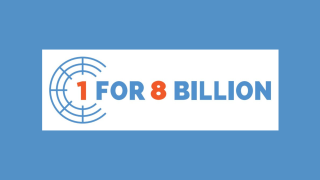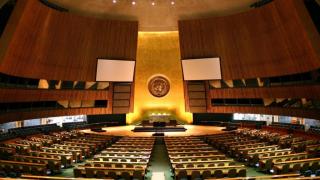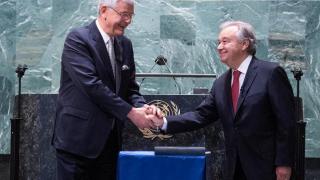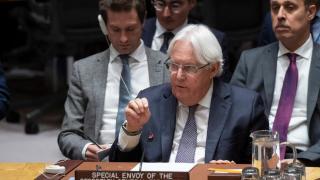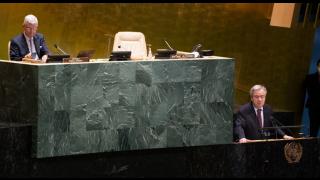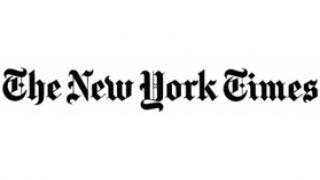
Leading U.S. newspaper The New York Times has today published a comprehensive article covering the launch of the 1 for 7 Billion campaign.
The article, which also appeared in the print edition, makes a strong case for reform of the outdated system to appoint the UN's leader and draws attention to the letter that 1 for 7 Billion campaign partners have sent to world leaders demanding action.
A copy of article has been reproduced below:
Calls Grow to Broaden Search for Next U.N. Leader
Jockeying Begins to Find New Leader for United Nations
By Somini Sengupta, 5 Nov 2014
UNITED NATIONS — There is no job description for the world’s top civil servant, except to solve its messiest problems. There are no campaign rules, nor is there any list of qualifications, except what is left unsaid: He (and it has always been a he) must be palatable to the world powers.
Now, as jockeying begins for the selection of the next secretary general of the United Nations, to be chosen in 2016, momentum is building to open up the process. A coalition of nongovernmental organizations, supported by some former United Nations diplomats, is calling for a formal application process, including transparent selection criteria, an official shortlist of contenders and a chance for all member nations to evaluate the candidates.
The effort reflects a growing frustration with the dominance of the five permanent members of the United Nations Security Council, which bargain for influence over every important office within the system, most importantly the post of secretary general. The choice is made largely in secret, in council meetings held privately and in tough negotiations among officials from the five powers.
The coalition of nongovernmental organizations, which calls itself 1for7billion.org, described the process as “significantly outdated.”
“It falls far short of modern recruitment practices for high-level international appointments, as well as of the U.N.’s own standards and ideals,” the group wrote in a letter that it plans to send on Wednesday to the heads of all 193 members.
The group, which has started a website, added in its letter, “A more open and inclusive selection process engaging all U.N. Member States will also help to revitalize the U.N. and enhance its global authority.”
Its chance of success is unclear. The Security Council is led by its permanent members — Britain, China, France, Russia and the United States, all of which enjoy veto power — and efforts to expand the permanent roster have been stalled for years. Previous calls to open the selection process have failed. The new campaign is hoping to gain traction by raising a fuss on social media.
It comes as the United Nations is trying to tackle a raft of new crises that transcend national borders, including climate change, Islamist extremism, Ebola and a surge of refugees.
“This has been for a very long time a concentrated decision-making process,” said Juan Carlos Mendoza García, the ambassador of Costa Rica, which has long agitated on this issue. “We think it’s time to open it up.”
The current secretary general, Ban Ki-moon, finishes his second term at the end of 2016. His successor is to start in 2017. Exactly when the appointment will be announced is also unclear. There is no set timeline, which leads to intense last-minute power struggles.
David M. Malone, a Canadian diplomat who has written books about the Security Council and now serves as rector of the United Nations University in Tokyo, said the selection process created frustration among emerging powers that want to sit at the top table of world power.
“While several secretaries general have turned out to be accomplished,” said Mr. Malone, who is not part of the campaign, “the risk with opaque processes in the Council is that they will produce a low-common-denominator outcome, ultimately taking into account only the convenience and views of key members of the Permanent Five.”
The United Nations Charter does not specify exactly how its leader should be selected. In practice, for most of its 70-year history, the Security Council has submitted the name of its preferred candidate, who is simply ratified by the broader membership of the General Assembly. The Council’s decisions take place privately. And veterans of the organization say the world powers have been especially eager to control who gets the job since the tenure of Dag Hammarskjold, a famously independent Swedish diplomat who led the organization during the height of the Cold War from 1953 to his death in 1961.
Regional blocs have insisted on rotation, pushing for their diplomats to take a turn running the organization. That is not written in the charter either, but there is a growing chorus among diplomats here that the job should next go to someone from Eastern or Central Europe. Gaining consensus around such a candidate is likely to be difficult considering the deep divide between Washington and Moscow over issues including the crisis in Ukraine. There are also calls to select a woman; no female candidate has been seriously considered in the history of the organization.
“The selection process is not, at present, a serious search for the person, male or female, most qualified for this enormous job,” said Brian Urquhart, a veteran United Nations diplomat from Britain, now retired, who helped establish the organization’s first armed peacekeeping mission in 1956 during the Suez crisis. “The process is haphazard,” he said, "with no open search procedure, no vetting of candidates, no interviews, and a list virtually restricted to those who have declared themselves.”
---
A version of this article appears in print on November 5, 2014, on page A3 of the New York edition with the headline: Calls Grow to Broaden Search for Next U.N. Leader.
UPDATE: Campaign also highlighted in The Guardian
The Guardian article quotes senior UN experts, including Sir Brian Urquhart and Edward Mortimer, on the major shortfalls of the current outdated selection process. The article also covers the campaign's open letter to world leaders calling for improvements to the appointment process, which was endorsed by a number of leading NGOs.
The article is reproduced below:
UN urged to end ‘haphazard lottery’ of leadership selection process
Reform existing system before 2016 appointment or world will not get strong general secretary it needs, organisation warned
By Sam Jones, 7 November 2014
The UN must abandon the “secret deals and horse trading” that govern the selection of its secretary general and replace them with a fair and transparent process that ensures the best candidate gets the job, according to a coalition of NGOs, UN associations and former UN officials.
The signatories of an open letter to member states argue that, given the array of current crises, the selection of Ban Ki-moon’s successor as head of the UN in 2016 will be one of the organisation’s most important decisions over the next decade.
“The new secretary general will have to address a world confronted with increasingly dangerous civil wars, humanitarian and environmental disasters, terrorism, regressive development, economic and financial turmoil, and inequality,” they write. “The need for global leadership and international cooperation is greater than ever.”
But, they add, the procedure for choosing a secretary general – adopted in 1946 – is “significantly outdated” and incompatible with selecting the best candidate.
Under the existing rules, the members of the UN security council debate the candidates before nominating one and recommending them for appointment by the UN general assembly.
However, the process allows any of the five permanent members of the security council – China, France, Russia, the UK and the US – to veto any candidate. Convention also decrees that there cannot be two consecutive secretaries general from the same region.
The letter’s signatories, including Amnesty International, Avaaz, Civicus and the World Federation of United Nations Associations, want all UN members to be involved in the search for, and appointment of, future leaders.
Under the banner of the 1 for 7 Billion campaign, they are calling for “an end to the secret deals and horse trading that see five countries hold sway over an appointment that affects all the world’s people”.
They are also urging the UN to come up with an official shortlist, and to hold open sessions in which all states can question the nominees.
Sir Brian Urquhart, who served as personal assistant to the first secretary general, Trygve Lie, and was instrumental in the development of the organisation’s peacekeeping force, has long argued for the system to be overhauled.
“The next secretary general should be a man or woman of exceptional gifts and character, but it remains to be seen whether UN member states have any interest in improving the haphazard lottery that passes for a selection system, which would be rejected as a bad joke by any serious institution in the private sector,” he said.
“With no open search procedure, no criteria, no vetting of candidates, no statement of intent, no interview, and a list virtually restricted to those who have declared themselves, it is something of a miracle that the United Nations has been as well served as it has.”
Edward Mortimer, who was chief speechwriter and director of communications for the previous secretary general, Kofi Annan, said the current process was simply not fair.
“Last time round, China insisted that it was Asia’s turn, the US quietly agreed with China on Mr Ban as the most inoffensive Asian candidate, and Russia didn’t mind as long as it wasn’t an eastern European,” he said. “The choice was left, in effect, to just three people – George W Bush, Vladimir Putin and Hu Jintao. We woke up to that fact much too late. We cannot make the same mistake this time.”
The current UN deputy secretary general, Jan Eliasson, acknowledged the importance of the debate, adding: “I think one should try to be as universal as possible.”
Although he declined to say whether he personally supported calls for a change to the system, Eliasson paid tribute to Urquhart’s “valiant efforts” to reform the selection process and question the notion of automatic geographic rotation.
“He made the case, which is understandable, that one should go for the best possible person whatever region he or she comes from,” Eliasson told a roundtable discussion in London on Thursday.
“He also had the idea that there should be a search process, that there shouldn’t be people campaigning, there should be a search. That was debated, I was part of that group … [but] nothing much came out of it.”

